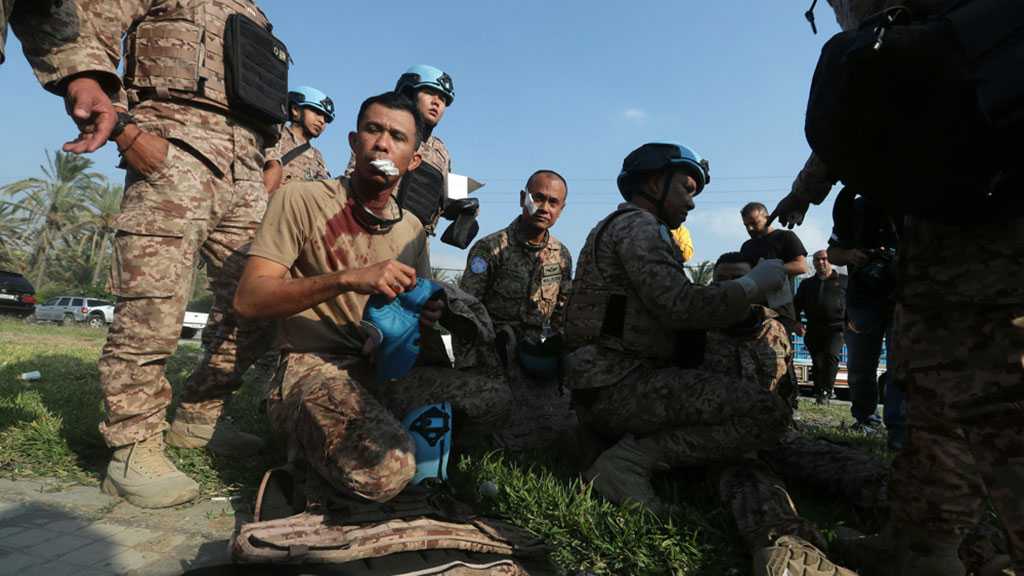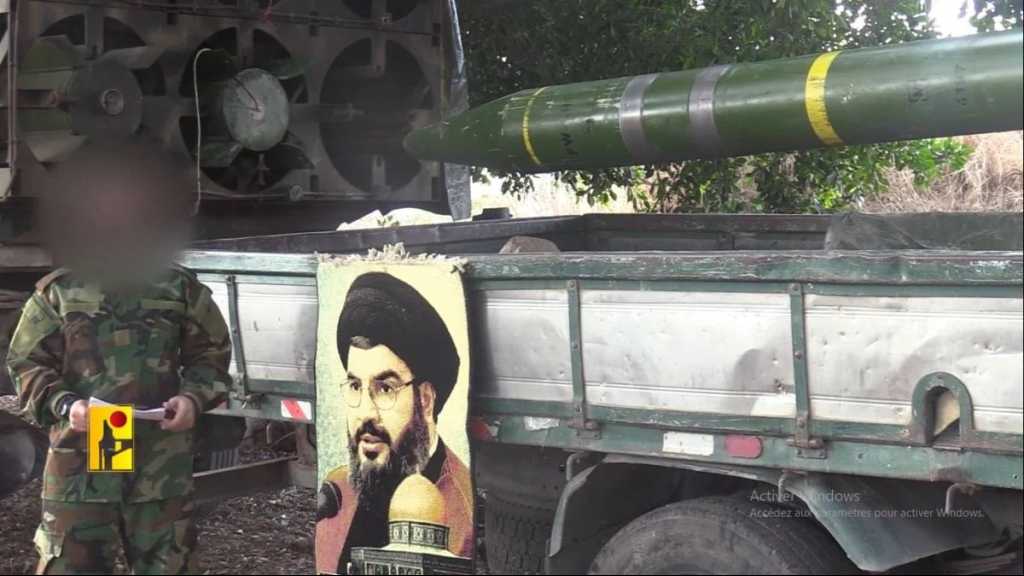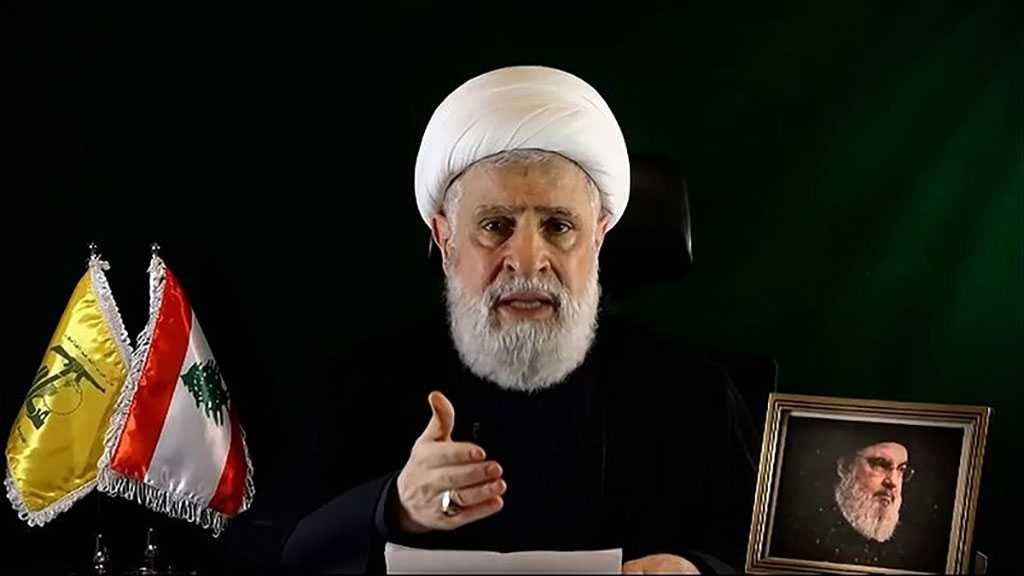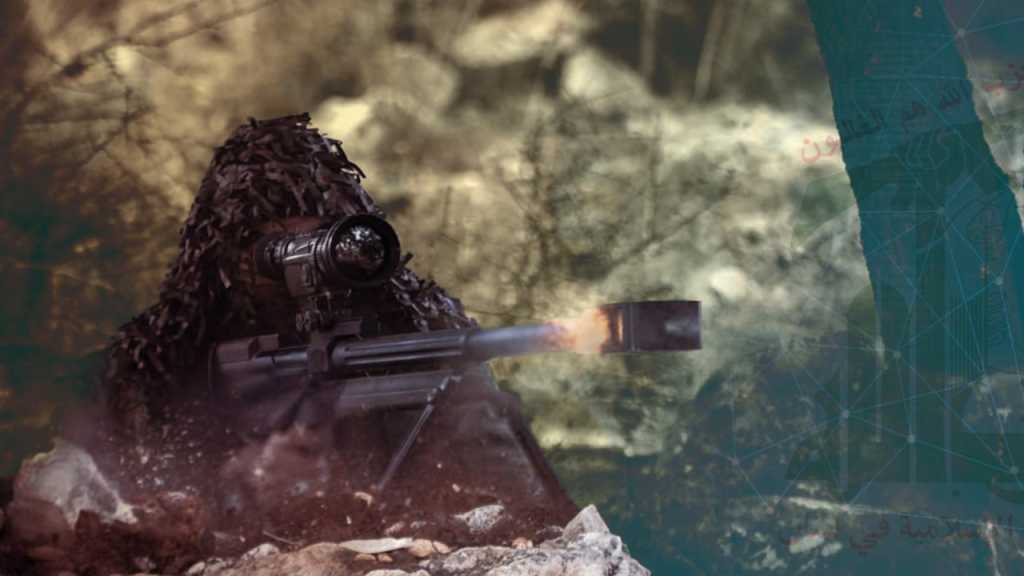Sayyed Nasrallah Vows Punishment for Every Crime: Hezbollah’s Guided Missiles More than Doubled
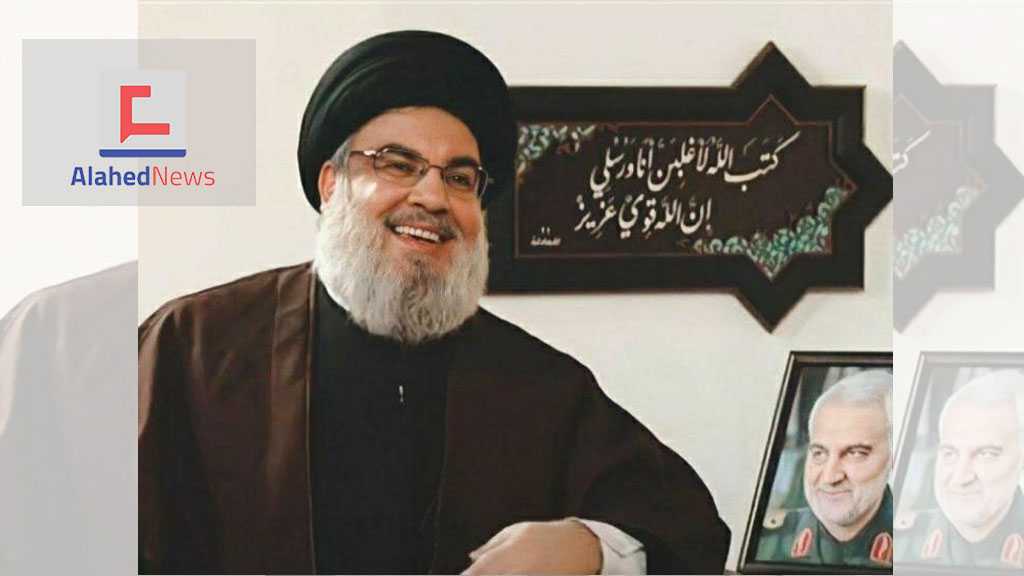
By Zeinab Abdallah
Beirut – Hezbollah Secretary General His Eminence Sayyed Hassan Nasrallah appeared on al-Mayadeen TV with Ghassan Bin Jeddo in a special episode named ‘Dialogue of the Year’. The four-hour long interview touched upon almost all regional issues that happened this year, although the pivotal segment was about martyr General Qassem Soleimani and Hajj Abu Mahdi al-Muhandis less than a week ahead of their first martyrdom anniversary.
Starting with the possible options that would take place during US President Donald Trump’s few days in office, Sayyed Nasrallah indicated that there is not accurate information that Trump or the ‘Israeli’ enemy will take an action. “There are just certain analyses,” His Eminence noted, adding that everybody is anticipating and expecting what Trump might do in the coming days.
“The Axis of Resistance is dealing cautiously, accurately and attentively so that no post of this axis would be lured towards any confrontation that suits the enemies’ timing, but when the enemy creates massive media noise, this means that it won’t do anything, and that it is rather waging a psychological warfare,” Sayyed Nasrallah stressed noting that “this doesn’t mean that we mustn’t remain cautious.”
Regarding the news about a possible ‘Israeli’ landing that has taken place along Lebanon’s Jiyeh coastline, the Hezbollah leader made clear that the party’s information doesn’t provide that any ‘Israeli’ landing has taken place as it was reported in media.”
Saudi attempts to assassinate Sayyed Nasrallah
Moving to the issue of assassination, the crime by which a US drone killed the Islamic Revolution Guard’s Quds Force Commander, and Iraq’s Popular Mobilization Units’ Second-in-command, Sayyed Nasrallah explained that many sides have warned him about plots to target him especially after the martyrdom of Hajj Qassem Soleimani. “This is something normal and well known,” His Eminence commented.
“I’ve been warned about assassinating me ahead of the US Presidential Elections, and that any targeting might be ‘Israeli’ or American,” the resistance leader explained, going further to uncover that targeting Hezbollah leaders is an American-‘Israeli’-Saudi goal: “I have information that Saudi Arabia has been stirring to assassinate me since the beginning of its war on Yemen, and private sources have informed me that Saudi Crown Prince Mohammad Bin Salman requested my assassination in person during his first visit to Washington and his first meeting with Trump.”
Sayyed Nasrallah cited the same sources as saying that Saudi Arabia took it upon itself that in case a war erupts after his assassination, it was ready to pay all the financial costs for this war.
“The Americans have agreed on a Saudi request to assassinate me, and that ‘Israel’ would execute this assassination. Saudi Arabia doesn’t act rationally, it has been acting maliciously especially in the recent years,” His Eminence went on to say, then he accused the US, ‘Israel’, and Saudi Arabia of partnership in the crime of assassinating leaders Soleimani and al-Muhandis.
“The crime of assassinating Hajj Qassem was a clear one, uncovered, and similar to the assassination of Sayyed Abbas al-Moussawi.”
Soleimani, the Sayyed’s own self
When talking about martyr Soleimani, Sayyed Nasrallah couldn’t have enough listing his manners and characteristics. He described the martyr as a very special person on the level of ethics. He also referred to him as a charismatic person who had the ability to influence all those who had to know him.
“On the military level, martyr Soleimani was a strategic and tactical leader at the same time,” His Eminence noted.
Describing the time that preceded the martyrdom, Sayyed Nasrallah said that he was very worried about him and he has warned him repeatedly.
“I miss Hajj Qassem very much… We have worked together and faced challenges together. I used to feel that Hajj Qassem and I were one person.”
Hajj Abu Mahdi, the main partner in Iraq’s victories
When talking about martyr Hajj Abu Mahdi al-Muhandis, Sayyed Nasrallah recommended that his identity should be more defined to the people, referring to him as a great person.
“Hajj Abu Mahdi al-Muhandis is very much like Hajj Qassem, and this is why they met in the battlefield, and Allah has concluded their lives with this martyrdom.”
His Eminence explained that Hajj Abu Mahdi al-Muhandis was suggested to assume [governmental] responsibilities in Iraq, but he preferred to work in the battlefield.
“Martyr Abu Mahdi al-Muhandis was a main partner in making the two victories against Daesh [the Arabic acronym for terrorist ‘ISIS/ISIL’ group] and the US occupation of Iraq,” Sayyed Nasrallah went on to say.
“He was one of the leaders of the Axis of Resistance that surpasses Iraq and reaches all regional causes.”
Hajj Qassem, the transnational resistance commander
When tackling the issue of the US presence in Iraq, Sayyed Nasrallah underscored that the Americans have left Iraq by force, humiliated and defeated thanks to the strikes of the resistance.
“The Americans fled Iraq under fire because they begged martyr Soleimani to stop the Iraqi resistance operations against them.”
As for Palestine, the Sayyed added that martyr Soleimani developed ties with all Palestinian resistance factions: “There were not any redlines for martyr Soleimani on the level of supporting Palestinian resistance factions,” uncovering that the ‘Kornet’ missiles reached the Palestinian resistance in Gaza thanks to martyr Soleimani.
“The efforts made by Hajj Qassem Soleimani and the Quds Force in supporting the Palestinian resistance factions were ongoing behind the scenes.”
Additionally, the resistance leader uncovered that the Russian-made ‘Kornet’ missiles Hezbollah used in the July 2006 war were purchased by Syria from Russia, and then Hezbollah took them.
Additionally, Sayyed Nasrallah made clear that Syrian President Bashar Assad agreed that the ‘Kornet’ missiles purchased by Damascus from Moscow reach ‘Hamas’ and the ‘Islamic Jihad’ resistance movements in Gaza.
Sayyed Nasrallah hailed martyr Soleimani and his team’s dedication to present all what could be offered to Palestine on all levels. His Eminence also praised Assad’s willingness to support the Palestinian resistance.
Normalization only took the masks off
On the level of Arab normalization with the ‘Israeli’ enemy, Sayyed Nasrallah noted that it is something that didn’t surprise him, adding that this is because most of the Arab regimes were only telling the Palestinians mere lies.
“We view the normalization deals from the perspective that masks have been taken off, and that those Arab regimes’ submissive realities appeared clearly.”
Iran is just a pretext the Arab regimes use to justify their normalization deals because they find the Palestinian cause as a burden for them, Sayyed Nasrallah added, stressing that there isn’t any reason that justifies the abandoning of Palestine.
Sayyed Nasrallah also lamented Morocco’s Justice and Development Party’s stance which he considered was more painful and more dangerous than that of the regimes’ normalization with ‘Israel’.
The ever-growing Axis of Resistance
In terms of power and numbers, the resistance leader emphasized that the might of the Axis of Resistance has multiplied many more times than its level several years ago, stressing that the most important thing is having a strong will.
“We are an axis in a state of legitimate self-defense, to defend our countries, sanctities, peoples, wealth. The Axis of Resistance has made major and great achievements,” His Eminence underscored.
“Without any exaggeration, the Axis of Resistance is stronger than any time before. The Axis was able to contain the strike of Hajj Qassem Soleimani’s martyrdom although it was very hard,” Sayyed Nasrallah pointed out.
Regarding the Ain al-Assad strike, Sayyed Nasrallah referred to it as an important response that shows how a leadership of a state in the world deals a blow to the United States: “The Ain al-Assad strike was a historical slap because the equation in confronting the Americans is not about killing, and Washington thought that by assassinating leaders it would put an end to the Axis of Resistance, while in fact this axis is not based upon a person by himself.”
His Eminence then vowed that punishing the killers of martyrs Soleimani and al-Muhandis is a goal for every honorable person, warning those who ordered and executed that they will be punished wherever they were.
“What the world should learn is that the blood of the leaders won’t be in vain, and the killers of Hajj Qassem and Abu Mahdi must be punished sooner or later,” Sayyed Nasrallah said.
His Eminence praised the joint drills held between the Palestinian resistance factions in Gaza as a very important step and a development that shows their strength and frightens the enemy at the same time.
Martyr Soleimani’s role in Iraq
Sayyed Nasrallah explained that martyr Soleimani’s appearance in media started with the battles against Daesh in Iraq, adding that it was not an intended issue.
“Hajj Qassem Soleimani didn’t seek being mentioned in a news, being in the spotlight or even hailed by anybody, and his relationship with the religious leadership in Iraq was good, especially on the level of main issues.”
Explaining that the vast majority of military operations against the US occupation in Iraq was carried out by the resistance factions, Sayyed Nasrallah said that groups of young Iraqis started the armed resistance against the US troops in Iraq without a political cover.
“Arab satellite channels refused to broadcast the videos that document the Iraqi resistance operations against the American occupation. Meanwhile, resistance in Iraq received real support from al-Quds Force and Hajj Qassem Soleimani.”
Sayyed Nasrallah contrasted al-Qaeda’s 4800 suicide attacks that were carried out against civilians on Iraqi soil, showing the difference when it came to the Iraqi resistance operations that were precisely meant to pressure the occupation and were very keen and accurate to avoid harming any civilian.
That’s why, Sayyed Nasrallah explained, the US Army threatened Hajj Qassem and al-Quds Force to strike their posts in Iran if they continued to support the Iraqi resistance: “The US Army then sent a message to Hajj Qassem to help them withdraw from Iraq without being hit by fire.”
Hadn’t been to the Iraqi resistance, Sayyed Nasrallah said that the US embassy would have been in control of Iraq.
However, Donald Trump keeps his troops in Iraq and Syria to steal their resources and oil, the Hezbollah leader added.
Forecasting the scheme against Syria
Sayyed Nasrallah narrated how martyr Soleimani was concerned about the American attempts to ride the tide of the peoples’ uprisings to target some regimes after America allowed toppling its man in Egypt, President Hosni Mubarak.
“Martyr Soleimani was the first to forecast the risks heading to Syria under the pretext of the ‘Arab Spring’, because the country supports the resistance.”
And while the parties that really backed, funded, and led opposition the groups in Syria rushed for an armed confrontation, Iran contacted opposition groups in accordance with President Assad to reach a political solution, but all of them insisted that we are not in a state of political solution and there won’t be negotiations with the regime, which they predicted will collapse within days, Sayyed Nasrallah went on to say.
“There was a very big international and regional decision in the war on Syria to prevent any political solution for the Syrian crisis.”
Foreign forces supported the Syrian opposition as they believed that the regime would be toppled within two months. They wanted to weaken the regime in Syria and in need of making a settlement with ‘Israel’ and recognize it, the Hezbollah leader recalled.
“We had only two options, either to surrender and let the region collapse, or to resist; and we chose resistance,” Sayyed Nasrallah said, hailing Syria’s independence of decision, braveness of leadership, and neither submitting to the enemies nor to the allies.
“Syria was not only targeted for supporting Palestine and the resistance, but also to be occupied and to allow stealing its oil and gas.”
President Assad’s decision to remain steadfast was the main motivator for his allies in supporting Damascus and engaging in the confrontation next to him.
“Assad didn’t leave Damascus at all over the course of the battles, and in the most difficult times of the war he was strong and solid,” Sayyed Nasrallah added.
Soleimani in Moscow
On the level of the Russian military intervention in Syria, Sayyed Nasrallah labelled it as very influential.
His Eminence recalled that Russian President Vladimir Putin was hesitant in the beginning of the war to enter Syria; then Hajj Qassem went to Moscow and explained, with maps, the field situation. At the time, Putin told Hajj Qassem that he was convinced with entering Syria.
“With his charismatic persona, strong logic, and strategic explanation, Hajj Qassem contributed to convincing Putin with entering Syria based on logic and facts.”
Soleimani in the July 2006 War
About memories from the July 2006 war, Sayyed Nasrallah recalled how martyr Soleimani didn’t leave the Southern Suburb of Beirut [Dahiyeh] but for 48 hours to submit his report on the situation and contact the brothers in Syria and Iran.
“All of the ‘Israeli’ aerial bombing during the July 2006 war couldn’t stop the logistic support from reaching the resistance in Lebanon,” His Eminence added.
After the end of the war, martyr Soleimani played a role and shouldered the responsibility of following the project of sheltering the displaced people. “The one who formed the Iranian Committee to Reconstruct Lebanon was Hajj Qassem and martyr Engineer Hossam Khoshnavis.”
Sayyed Nasrallah lamented that he could never forget that there are sides within the Lebanese political authorities who were planning to keep people homeless for the longest possible period of time after the July 2006 war to incite them against the resistance.
Commenting on martyr Soleimani’s successor, Hajj Esmail Ghaani, Sayyed Nasrallah said that he used to meet him repeatedly when he was Hajj Qassem’s deputy: “He was informed with all files. And Hajj Qassem used to say that Hajj Ghaani is to succeed him.”
The void ‘Israeli’ threats
In a strong and confident comment about the Lebanese resistance group, Sayyed Nasrallah underscored that Hezbollah is at it is: “Its strength, morale, and will are the same, or even much powerful.”
All the threats you hear from the enemy are because it knows that we will retaliate for its killing of our martyr in Syria. We are keeping our promise to respond to the ‘Israeli’ enemy’s killing of martyr Ali Mohsen, His Eminence made clear.
“The major alertness of the resistance was on all levels and in front of the ‘Israelis’’ sight. The ‘Israeli’ drones’ movement in the air is very confused as it anticipates the resistance’s response. The ‘Israeli’ knows that we have used the appropriate weapon towards its drones without making this public.”
The Hezbollah leader further announced that the precision-guided missiles owned by the resistance have doubled from the number it had a year ago.
“The resistance today is in a very good condition, and at the best of its capabilities. We believe in the future and trust that we are approaching victory.
The concerned party is the ‘Israeli’ and not the resistance especially as Trump is leaving and Washington might return to the nuclear deal with Iran.
A certain level of Hezbollah’s aerial defense has been exposed to the enemy, but whether there are higher levels or not is a matter that we don’t reveal, Sayyed Nasrallah said, noting that “we are keen to keep the ‘Israeli’ unaware of a lot about what the resistance has.”
“There are many issues that the ‘Israeli’ knows nothing about.”
Our Axis is on the top and it is ‘Israel’ which is in trouble, His Eminence underscored, adding that the resistance’s decision is to carry out an appropriate response that strengthens its deterrence; this won’t be achieved without targeting the enemy’s soldiers, he said.
“We don’t need a demonstrative action along the border that targets dummies. We want an actual response.”
Lebanon’s maritime borders, Gov’t issue
In a question about Lebanon’s indirect negotiations with the ‘Israeli’ regime regarding the demarcation of the maritime borders, Sayyed Nasrallah was confident to say that the negotiations under the current US administration will reach a dead end.
“Our right to prevent any ‘Israeli’ stealing of our waters is natural, and our ability to do this is non-negotiable,” His Eminence underscored.
Elsewhere in the interview, Sayyed Nasrallah said there is a positive atmosphere and cooperation between the Prime Minister-designate Saad Hariri and Hezbollah.
However, he noted that there is a problem of trust that delays the formation of a Lebanese government, which is mainly between President Michel Aoun and the PM-designate.
The environment embracing resistance
On the level of discussing the resistance’s weapon within its own people, Sayyed Nasrallah said that the people of South Lebanon don’t see resistance as a burden, they rather view it as their shield.
“We support the threatened and targeted environment of resistance which is paying prices for this support, His Eminence said in reference to the sanctions targeting the entire country, “We try and we seek to present aid to the Lebanese people and to our environment with all possible means.”
Sayyed Nasrallah noted, however, that the problem in Lebanon is a problem of choices, and the evidence is that nobody dared to head eastward to find economic solutions.
“There is a misevaluation in linking solving some issues for some countries with the foreign factor.”
From this point, Sayyed Nasrallah went on to explain that Iran is a great regional power and a main axis in the region but it doesn’t negotiate instead of any of its allies in the region.
Iran, a non-interventionist superpower
“Iran doesn’t buy, sell, or negotiate with the Americans instead of the peoples of the region,” the resistance leader noted, adding that the Islamic Republic of Iran informed the Europeans that it is not concerned with negotiating on behalf of the Yemenis or others.
“Washington insisted to negotiate the Iraqi issue with Tehran; Iran, however, insisted that the Iraqis be present and that the negotiations be held in public.”
The Hezbollah-Hamas relations
Hezbollah leader said that he met with Palestinian resistance movement, Hamas, brother Ismail Haniyeh several times during his last visit to Lebanon and discussed with him different regional issues that included bilateral relations and the relations with Syria.
“Relations between Hamas and Syria must be rearranged; there is a positive atmosphere even if it takes time. Logically, I believe that Hamas is tending to rearrange its ties with Damascus,” Sayyed Nasrallah said, noting that he talked with Haniyeh that Hamas should help in redirecting tendencies in the region, which include the Islah [Reform] Party’s fighting in Yemen against the Ansarullah movement.
Sayyed Nasrallah also greeted the Palestinians of the 1948 lands whom he described as “our brother and our people, and they are the ones who mostly desire the liberation of Palestine from the river to the sea.”
“In any future war, the minds and hearts of the Palestinians of the 1948 lands will be with us.”

